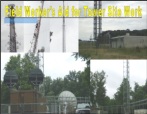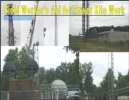Podcast: Play in new window | Download | Embed
Subscribe: Apple Podcasts | RSS
I wanted to let everyone know that I will be at the IWCE conference in March, 2015. I will be on the “Tower Safety and Regulatory Compliance” panel on March 17th, 2015, starting at 1PM local time. It is in Las Vegas at the convention center. Click on any of the BLUE words for more. There will be an impressive group who I am honored to share the stage with. I will be up there with Cory Crenshaw of Crenshaw Communications, Charles Ryan of Concept To Operations, Inc, Dr. Denis Boulais of Bytecan Pty Ltd, and Robert Johnson of Narda Safety Test Solutions. My track will be sponsored by AGL Magazine. If you can make sure you go to see what is happening with today’s wireless communications systems. I feel honored to be selected to be on the panel. So if you can think of anything I should be talking about, then let me know below.
Go to Wade4Wireless products page where I have product links. and an audiobook for the eBook. If it helps, download the free eBook for a SOW Overview for more information.The Scope of Work training, SOW training package, I made for you to understand how the SOW will affect your payments and bottom line as well as the customer and safety requirements. The SOW is your key to getting paid and to defining change orders! Because you asked for an audio book I put the Tower Climbing: An Introduction in audio so you can listen while you’re driving or too busy to read! Hey, don’t forget to sign up for my monthly newsletter over there on the top right. > > >
OK, more feedback.
This is from Feedback on Drugs, Morons, and Steel.
Comment: I appreciate the comment about working on the beacon on top of a mast. Like so many other precarious situations on a tower, a small rail around the mast to stand on and one around the beacon to hook off on is easily designed and manufactured—-unless it is required to support a 5,000# load as OSHA requires.
On the drug issue, there are a very high percentage of tower hands that use drugs. There is an even higher percentage that drink excessively, but not on the job. If accurate statistics existed, which they don’t, they would reveal that there are very few fatalities caused by someone being high or drunk. There are more accidents attributed to stupid than intoxicants, and there are a lot of hands that are stupid even when they are sober.
I watched the video of you with Kelly Hill and I totally disagree with you on the use of capstans on a tower job. To begin with, you have to use a fiber rope with a capstan, not a wire rope. The statistics will show that there are numerous fatalities caused by ropes breaking, but not wire ropes. Fiber ropes are good for a tag-line or a trolley, but certainly not for hoisting loads up and down a tower. I can cite four accidents where ropes broke that caused the death of twelve people.
The accident you referred to where the five men were killed was the 2,000′ Senior Road project in Houston. The men were riding the top half of the FM mast dressed out with the panel FM antenna. I think the load got too close to the tower and hung up which caused the picking channel across the face to fail. The load fell and hit the guy wire causing the whole tower to come down. I was hired as an expert witness by the firm representing Harris is why I am so familiar with this accident.
Riding the winch line is safe!!! Much safer than free climbing and every job that requires the hoisting and lowering of antennas and/or mounts should be rigged with a wire rope.
Response: I called this guy and he is amazing. He is a big fan of winches, but only if you use cable versus rope. That is where I got the idea for the blog “Rope Versus Steel Cable for Hoists”. We also talked about my video with Kelly Hill of RCR and he mentioned that the thing he disagreed with was the way I mentioned the safety of the winches. I made it clear that only a larger hoist should be used for man loads and he agreed. Now, as far as the accidents go, he knew so much about many of them. I plan to talk to him more in the future.
This is feedback from “Are work schedules Killing the Wireless Field Worker? Yes!”
Comment: Wade;
Scheduling is most definitely a problem, and a serious one. Unless you have been there and suffered in extreme conditions, you cannot fully comprehend the difficulty in working in subfreezing temperatures in a 15 or so mph wind. When you are in the midst of work on one of these days, you cannot help but wonder why this job wasn’t scheduled two months earlier or two months later. And you are not receiving any additional compensation for your suffering, and if you so chose, you could be at home in a warm house with your family—-maybe sort of like the bodily orifice that scheduled this project.
When that anger starts building up inside, it doesn’t take much of a reason for a man to suggest to his boss to “just take this job and shove it.”
If you don’t have a foreman with great leadership skills to keep this project under control, which means leading, not pushing, this job is going to go bad real quick. And when it stalls, nobody ever thinks of blaming the scheduler, they always blame the contractor and the crew.
I learned early in my career the difficulty of working in extreme conditions and I have always made every effort to avoid putting a crew up north in the winter. I have a famous quote that I use when scheduling jobs, it’s “If you’re gonna be stupid, you gotta be tough.”
I could write for hours telling stories about winter in the north without informing anyone of anything that they didn’t already know. I don’t really think the professional people who organize and schedule the jobs even care.
Response: Been there and done that, it is a tough job! I would bet that so many people have stories where they didn’t know how much they could take in the weather until they did it.
This is feedback from “Is Small Cell Deployment Cost Prohibitive?”
Comment: Thanks for this article with a high level approach to analyzing costs and benefits of small cell deployment. It raises more questions for me ultimately, and that is a good thing! I appreciate your work and insight, thanks!
Response: Thank you sir!
Comment: #4 small cell = small power demand. Depending on the load, duty cycle and site location an off-grid solar electric system could be the small footprint economical power solution rather than the minimum 100A service expense.
This is feedback from “Loyalty versus the Lowest Bidder in Wireless.”
Comment: Enjoyed the article. It is very timely for me. Having serious problems getting paid. Company/worker loyalty in an unbiased format would be a good article also if not already done.
Response: Thank you! It’s a shame that even today people are not getting paid for the work that they do. Why is it that loyalty to the people working so hard can dissipate so quickly?
Comment: Just left a company 2 months ago for lowering my per diem from $600 to $500 per week. And had us on a 40hr. Week salary working 60 – 80 + hrs. A week. And only got home every 2 or so months.
Response: This is often the case when they try to make tower climbers salary. So many times the way companies raise margin is to screw the worker. That is very common in the industry. If it happens to you I would look elsewhere like this guy did, it is only a matter of time until they start making more cuts.
Response: Good point! Solar would be awesome! If the physical footprint would remain small with the batteries I see it as a viable solution.
This is feedback from “Loyalty versus the Lowest Bidder”.
Comment: Wade, Reminds me of the stories we hear constantly with tower tech’s where they had to finish work started in the early morning and ended after dark. The real part of the story is they had to drive 5 hours before and after the climb! This is plain dangerous! Completion bonuses, etc, etc, are nice to get your sub’s to hustle but would you like to explain to a jury why you had people in dangerous jobs working these hours?
Response: I agree, sometimes the worker put in such long hours and no one cares because they feel the work is more important and the customer may not know what the worker is going through. The workers need representation in the company.
Comment: Very good Mr. Wade, hope we get a Congressman to help us. The situation should be better for a person who chooses to work in this field! Thank you!
Response: I think that the FCC working with DOL should help by creating TIRAP. It is still voluntary but it’s a start. This is a chance for the government to recognize the seriousness of the climbing industry hazards.
Comment: I have been in the industry for 12 years, each year it get worse for tower hands… this industry makes more money than it knows what to do with and what they need to realize is this technology isn’t going to put itself up on any tower, water tank, or roof top without the tower hands that do it… appreciate your employees and treat them better… give better pay, appropriate per diem, and most of all better hours… the majority of tower workers have families, think about that when you go home to yours everyday and you have several crews that only see theirs 8 weeks out the year…… if that…….. so when you get on your cell phone to make your next call think about the guys that sacrifice so much for you to be able to enjoy that luxury and think about what they endure to provide you that luxury
Response: Like I said before, so many companies think that to raise margin they need to cut per diem and employee salaries. It is common. I guess the CFO that is sitting in his office that gets to work from 9 to 5 and go home every night to his family makes the decision that the tower crew who leaves Monday and won’t get home Friday night should skip meals. I guess they forget that physical work as well as engineering might burn a few calories each day. I guess they determined that they can always find more grunts. Good luck with that strategy. I have learned that it pays to take care of your employees, but there are so many people who just stay at a company because it’s a job and they don’t want to leave, no matter how bad the company treats them.
Comment: We have been blessed to be able to work with customers and vendors that have created a loyalty around what we do. We for the first time have really felt the issues of low bidder and the companies that go out of business one day and start again tomorrow. We hope that our customers will determine that it is not a low bid industry and will continue to give us a chance to do work and be profitable. The 3rd party companies and now the equipment providers have created hard times for the small company trying to keep up with increased pricing pressure and hard to find quality staff. They know they can stop us from taking work by buying a competitor and lowering their prices to push us out.
Small business can only grow with the help of our customers. We need them to demand companies to have experienced employees and not just how many crews you can come up with. We have to stop the companies and owners which have failed multiple times but keep doing work. We know these are the companies that have made the industry unsafe and less profitable for the hard-working small businesses.
Have a safe Thanksgiving.
Response: Thank you and I hope you had a great Thanksgiving as well. This is a great thought, I would like to think this is where the industry is headed, quality over quantity.
Some helpful links below.
Antenna basics free tutorial http://host.comsoc.org/freetutorial/rohde4/rohde4.html
http://www.cdc.gov/niosh/topics/coldstress/
http://www.wirelessestimator.com/blue-book/#!/
Please, please, please help the Hubble foundation. Don’t you want to support an injured tower climber’s family? Here’s how, click on the Hubble picture below and look for the donations button and give today! Thank GOD for the Hubble Foundation!
Get on iTunes for Wade4wireless then subscribe and write a review now! Just click on any ICON below!















